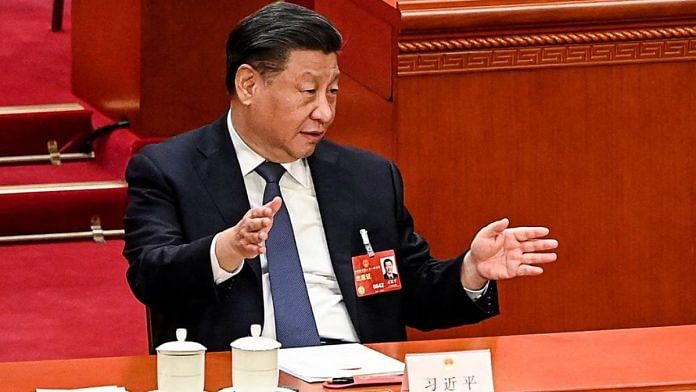Against the backdrop of critical economic challenges in China, two sessions are being convened in the country, which will last for about two weeks: the second session of the 14th National People’s Congress and the Chinese People’s Political Consultative Conference. The sessions, integral to the functioning of the Chinese government, saw Premier Li Qiang present his first government work report, which delineates policy goals for 2024.
The atmosphere at the NPC was described as “subdued” by a foreign correspondent based in Beijing, indicating a departure from the usual fervour surrounding such events. Breaking away from tradition, China has also scrapped the annual post-parliament press conference of the premier, which he had been conducting since 1993.
Major takeaways
In his address at NCP, Li attributed China’s hardships to the challenges posed by three consecutive years of the Covid-19 pandemic. As expected, there was significant emphasis on initiatives aimed at economic recovery. Highlighting the 5.5 per cent unemployment rate, Li said efforts are underway to generate 12 million urban jobs. China achieved a GDP growth rate of 5.2 per cent in 2023 and is forecasted to sustain a similar rate this year. However, economists say the growth rate appears ambitious due to the sluggish economy.
On 18 February, the Chinese Ministry of Commerce reported a decline in foreign direct investment (FDI), prompting Li to underscore the country’s commitment “to fostering a stable, transparent, and predictable policy environment for enterprises, with the aim of addressing this issue and supporting economic stability and growth”. He also affirmed that Beijing “will strengthen services for foreign investors and make China a favoured destination for foreign investment”.
What is particularly remarkable is the continued increase in defence spending. China disclosed intentions to boost its defence budget by 7.2 per cent this year, reaching $231.4 billion from $224.8 billion in 2023.
Moreover, the NPC report conspicuously omitted any mention of the ‘peaceful reunification’ of Taiwan, signalling a persistent adherence to tougher rhetoric on the neighbouring country. The issue has always been an important topic during the NPC. Rhetoric regarding Taiwan escalated on Weibo and other social media platforms. One suggested excluding the provincial-level Taiwan Affairs Office from the two sessions, arguing that such offices do not aid the reunification cause. Rather, the Weibo user claimed, they provide special treatment to the Taiwanese, fuelling independence sentiments and widening the gap between Taiwan and the mainland. While no such proposal was formally put forth, this shows that mainstream China is hotly debating the Taiwan issue and how central the matter is to the two sessions.
In terms of foreign policy, the usual rhetoric centred around concepts like “win-win cooperation”, which was reiterated frequently. Despite escalating tensions in the South China Sea, the emphasis remained on downplaying conflicts with neighbouring countries. The objective has been to portray China as adept at managing external relations despite existing disparities, although the reality appears different.
The mention of the Belt and Road Initiative (BRI) underscored the country’s commitment to the project. Particularly noteworthy was the focus on smaller and more cooperative countries as target partners. China has also increased funding for its diplomatic endeavours by 6.6 per cent, although the specific allocation remains undisclosed, potentially hinting at its utilisation for chequebook diplomacy. Additionally, there was a subtle reference to the United States, with China advocating for its own version of a multipolar world and expressing opposition to Western bullying and hegemony.
Also read: China is worried about low FDI. Not fixing ties with India, US, Australia will worsen it
What does it tell us?
Li’s address and the proceedings underscore the primary focus on addressing the sluggish economy and China’s efforts to mitigate it. However, the increase in defence spending signals a continuation of assertive foreign policy and military aggression in the Indo-Pacific.
The pervasive influence of ‘Xi Jinping Thought on Socialism with Chinese Characteristics for a New Era’ is remarkable, particularly since its enshrinement in the country’s constitution. This underscores China’s rapid transition toward embodying Xi’s vision, solidifying his authority and control. The dominance of Xi and his legacy is palpable, indicating that what is transpiring is not merely the evolution of the People’s Republic of China but the embodiment of Xi’s enduring influence and the projection of what could now effectively be termed as Xi’s China.
The proceedings of the two sessions offer insights into China’s future trajectory concerning its economic, foreign, and defence policies. Besides an acknowledgement of existing challenges, China is also focusing on core issues such as Taiwan and reinforcement of its hegemony. Economic woes, coupled with assertive foreign policy, could exacerbate China’s problems. However, Beijing’s priority for now should be stabilising its economy and addressing the growing unemployment issue.
Sana Hashmi, PhD, is a fellow at the Taiwan-Asia Exchange Foundation and George HW Bush Foundation for US-China Relations. She tweets @sanahashmi1. Views are personal.
(Edited by Humra Laeeq)



